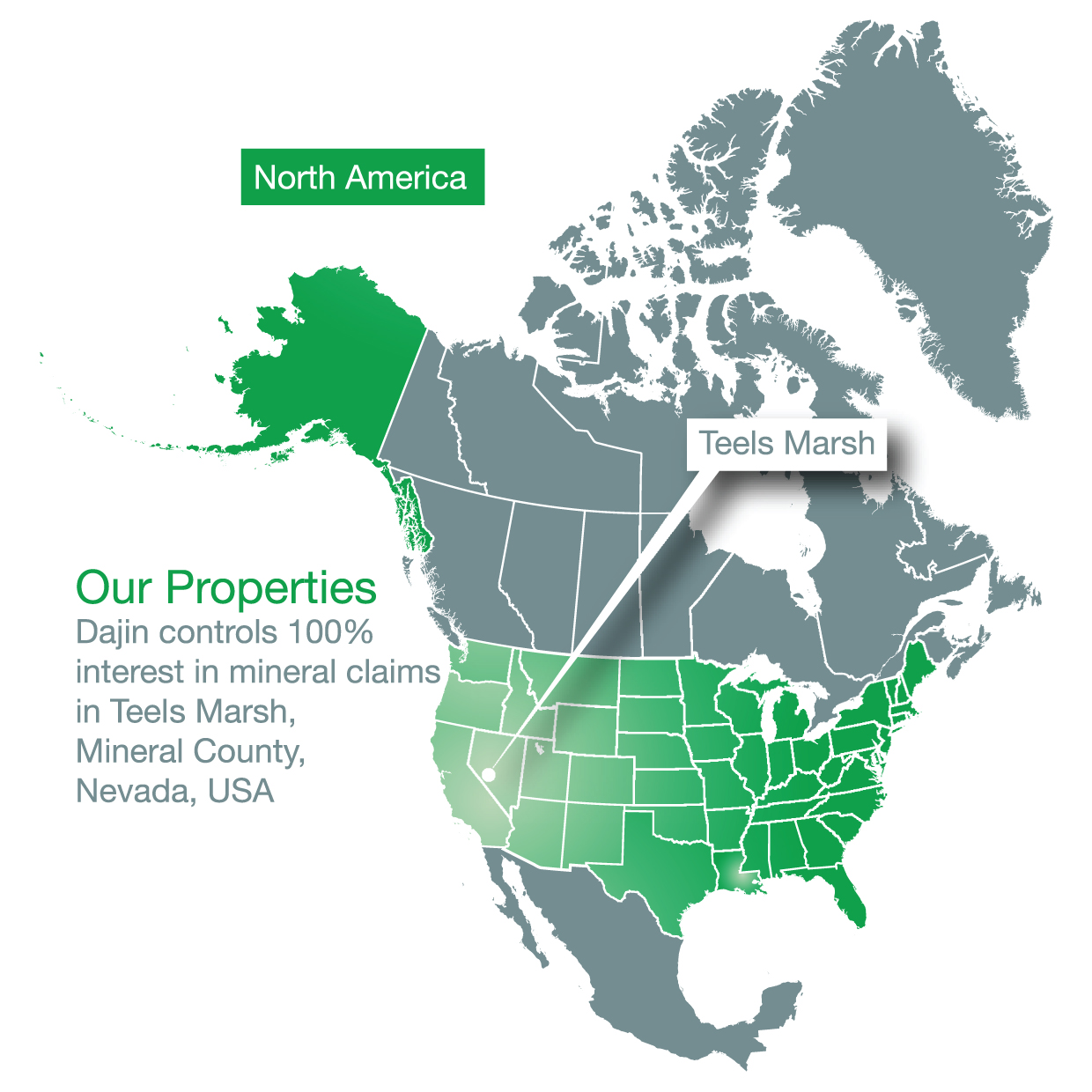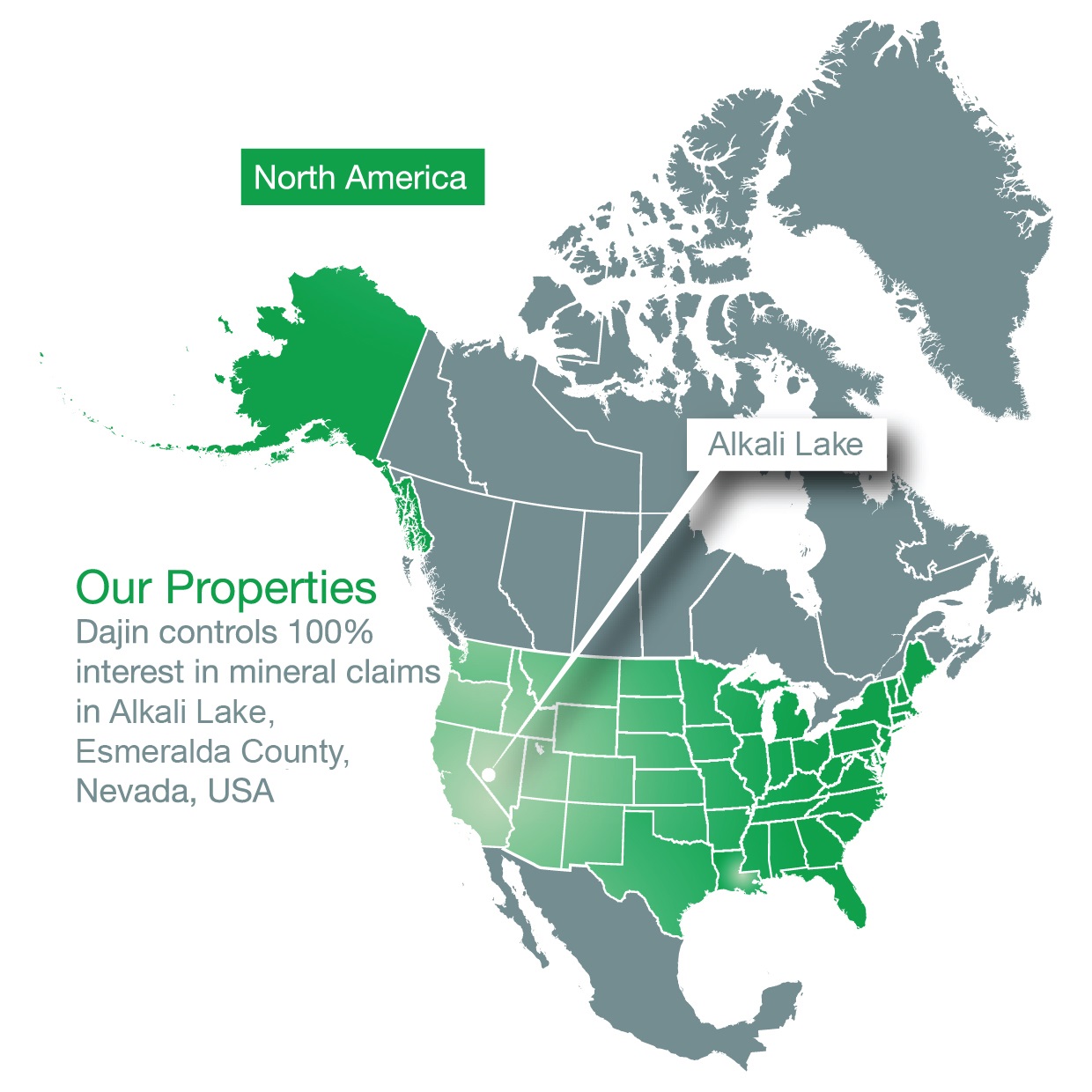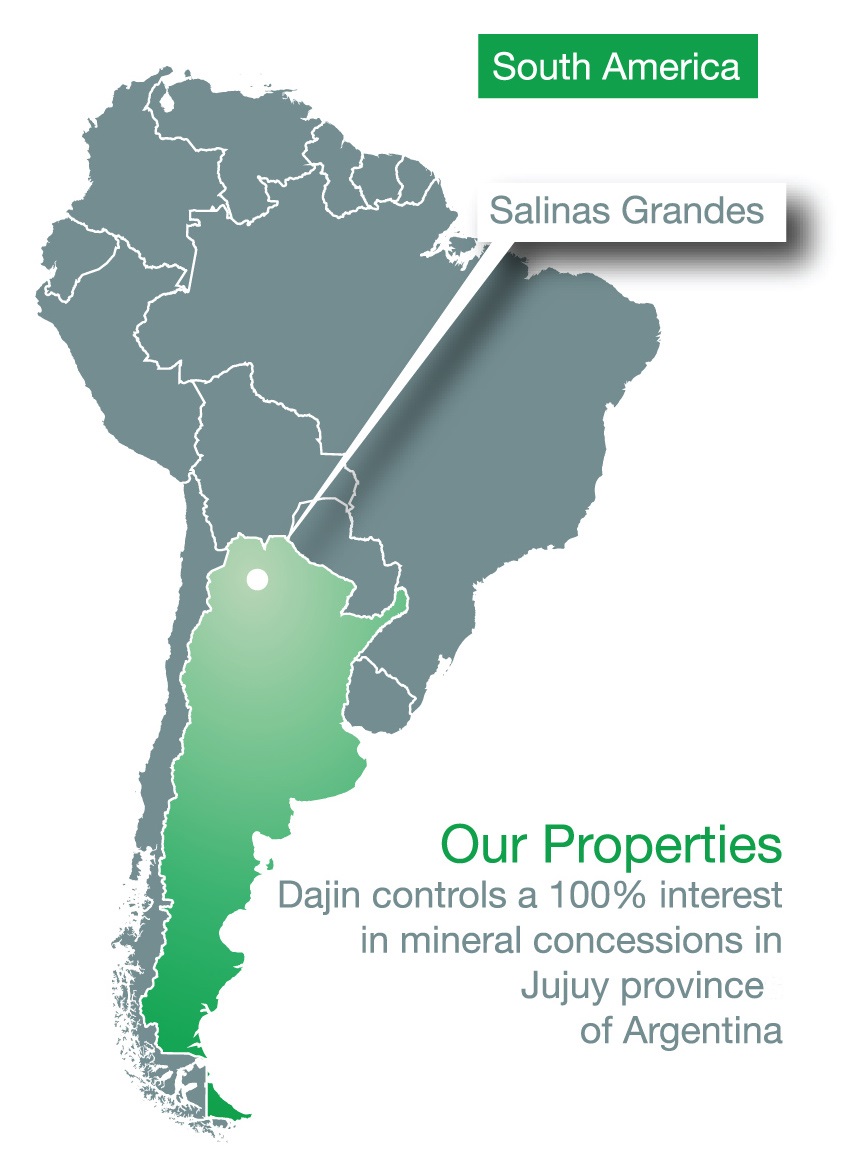Last Trade: Change: 0 Volume: 0
Last Trade (1969-12-31): Change: 0 Volume: 0
Last Trade: Change: 0 Volume: 0
Last Trade (1969-12-31): Change: 0 Volume: 0
 Dajin Lithium (US) Corp. has 100% ownership of 403 placer claims covering 7,914 acres (3,202 hectares) of the Teels Marsh area. This area of the Teels Marsh was extensively prospected by the well-known prospector, “Borax” Smith. In 1867, Smith began processing borax and salt deposits. This property eventually became part of the early history of the giant borax producer, U.S. Borax Inc., a wholly owned subsidiary of one of the world’s largest mining companies, Rio Tinto PLC.
Dajin Lithium (US) Corp. has 100% ownership of 403 placer claims covering 7,914 acres (3,202 hectares) of the Teels Marsh area. This area of the Teels Marsh was extensively prospected by the well-known prospector, “Borax” Smith. In 1867, Smith began processing borax and salt deposits. This property eventually became part of the early history of the giant borax producer, U.S. Borax Inc., a wholly owned subsidiary of one of the world’s largest mining companies, Rio Tinto PLC.
With the recognition of Lithium and Boron in the Teels Marsh brines, it was concluded that these brines were formed by the evaporation of water leaching from volcanic ash, originating from the the super eruption of nearby Long Valley Caldera, California. This is the same ash fall environment that contributed to the Lithium brines of the nearby Clayton Valley/ Silver Peak operations of Albemarle Corporation, which is the sole Lithium producer in the USA. Historical reporting of the Teels Marsh property, by the US Geological Survey (OFR: 76-567) indicates Lithium concentrations in the Teels Marsh playa brines of up to 850ppm. A report by the Clay Minerals society in 1981 analyzed 17 interstitial brine samples at Teels Marsh, which contained concentrations of Boron ranging from 214 to 893ppm.
 Dajin Lithium (US) Corp. has 100% interest in 62 placer mineral claims covering 1,240 acres in the Alkali Lake valley, in Esmeralda County, Nevada.
Dajin Lithium (US) Corp. has 100% interest in 62 placer mineral claims covering 1,240 acres in the Alkali Lake valley, in Esmeralda County, Nevada.
Dajin has entered into an Earn-in Agreement with Lone Mountain Resources, LLC (“LMR”), a privately held US Lithium exploration and development company affiliated with Lilac Solutions, Inc. Lilac is a well financed Lithium extraction technology company that LMR anticipates will provide technology and services to advance the project.
For LMR to earn a 75% ownership interest in Dajin’s Alkali Lake Lithium project LMR has paid US $25,000 and agreed to make project related expenditures of at least US $200,000 prior to August 31, 2022. An initial work plan consisting of surface sampling and geoscience work has commenced to define the optimal location for an exploration well expected to be drilled to a depth of 1,500 feet to assess rock and brine properties.
The Agreement encompasses a 3-mile area of interest around the current claims. Upon satisfying the terms of the Agreement, Dajin may enter into a joint venture mining agreement or retain a royalty interest of 3% of the value of all minerals extracted and sold by LMR. LMR shall have the right to purchase the 3% royalty from Dajin for US $1,500,000.
The Alkali Lake valley Lithium property is located approximately 7 km northeast of Albemarle's Silver Peak Lithium Brine mine, operation, the only producing brine based Lithium mine in operation in North America. Like Clayton Valley, Alkali Lake valley is a classic, fault bounded closed basin.
There is an active geothermal system, Alkali Hot Spring along the southern margin of the basin. Just as with circulating basin waters, deep fluids, particularly hot ones associated with the geothermal resource, dissolve rocks, liberating Boron, Lithium and other elements such as sodium and chloride. These minerals are brought to the surface as springs emanating from the faults bounding the playa. The association of a closed basin with an arid environment, a geothermal system and plentiful sources of Lithium suggests that Alkali Lake valley may host significant Lithium rich brines.

Dajin Resources S.A. owns a large land position in northwestern Argentina, part of an area known as the “Lithium Triangle” where it has been reported that 80% of the world’s supply of Lithium is found in flat salt lake basins, also known as “salars” or “brines.”
On August 8, 2016, Dajin's wholly owned Argentinian subsidiary, Dajin Resources S. A., signed a binding Memorandum of Understanding ("MOU") with LSC Lithium Corporation ("LSC") whereby LSC was granted an option to earn a 51% interest in Dajin's Lithium properties in Argentina.
Lithium brine bodies in salt lakes, or salars, are formed in basins where water which has leached the Lithium from the surrounding rock is trapped and concentrated by evaporation. The process of extracting the Lithium from the brines involves pumping the brine into a series of evaporation ponds to crystallize other salts, leaving a Lithium-rich brine solution. This brine solution is further processed to remove impurities before conversion to either Lithium carbonate or Lithium chloride for further upgrading to Lithium hydroxide. The majority of Dajin’s concessions are on the Salinas Grandes/Guayatayoc salar. Seismic interpretations suggest these salars may be as much as 800m thick.
Dajin’s concessions are contiguous with a number of concessions owned by Orocobre Limited (TSX:ORL-T) which announced in 2010 that preliminary sampling on the Salinas Grandes indicated highly concentrated deposits of Lithium and potassium over an area of approximately 60 square kilometres. A subsequent 12 hole diamond drill program and 47 holes of shallow auger drilling lead to an estimated inferred resource of 56.5 million cubic metres of brine at 795 milligrams per litre Lithium and 9,550 milligrams per litre potassium, which is equivalent to 239,200 tonnes of Lithium carbonate and 1.03 million tonnes of potash based on 5.32 tonnes of Lithium carbonate being equivalent to one tonne of Lithium and 1.91 tonnes of potash being equivalent to one tonne of potassium.
Dajin believes that a drill program on its concessions could produce similar results as Orocobre and ultimately lead to delineating its own resource. Also active in Jujuy province, and adjacent to Orocobre’s Olaroz Lithium project, is Lithium Americas Corp. (TSX:LAC-T) which has commenced construction of its Cauchari-Olaroz project.
Nearly one-half of the world’s Lithium production comes from the Lithium brines in the Andes mountains region that encompasses parts of Argentina and Chile. This area, commonly referred to as the “Lithium Triangle,” includes the Salinas Grandes salar, which is the site of Dajin’s extensive land package. In the mid-1990s, the development of these large-scale, low-cost brine resources in Chile and Argentina by Sociedad Quimica y Minera S.A. (NYSE: SQM), Rockwood Lithium Inc. (NYSE: ROC) and FMC Lithium (NYSE: FMC) fundamentally changed global Lithium supply. With its cost advantage of extracting Lithium brines over hard rock, mineral-based production brine producers have lowered prices to gain market share.
In March 2019, Pluspetrol Resources Corporation B.V. acquired all of the issued and outstanding shares of LSC Lithium Corporation for approximately CDN $111 million. LSC Lithium held an agreement to acquire a 51% interest in Dajin Resources S.A with the exploration expenditure of CDN $2,000,000 on the Salinas Grandes salar.
In October 2019, Pluspetrol earned a 51% interest in Dajin Resources S.A. with the expenditure of US$1,250,000 on the Salinas Grandes salar and payment of US$600,000 to Dajin Lithium Corp.